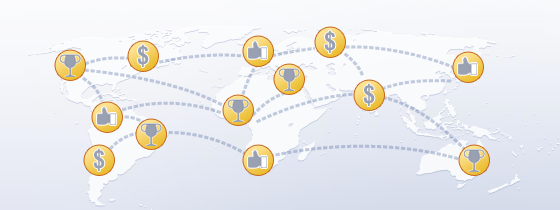How Gamification Triggers Facebook in Being on Addictive Game of Sociality

I wrote a thesis about the new trend of gamification and specifically the gamification of the social networking site. With the gamification of the social network I am not speaking about the invasion of social games like FarmVille, but that the act of social networking itself has become game-like. For who is interested, it is available here.
It argues that Facebook is comparable to a MMORPG (Massive Multiplayer Online Role-Playing Game) and that the gamification of social networks creates a new kind of social playing that leads to Market driven friendships. The advent of gamification has caused new and changing dynamics in the fields of marketing, game design, cultural sciences, economics and in our very own day-to-day behavior. Gamification seems to be one of the latest trends of corporations to compel the consumer to their services and products. It uses game mechanics such as points, challenges and leaderboards to engage the user. The way these game mechanics work are reminiscent of the techniques that gambling games and games such as MMORPGs employ to foster addictive behavior. This thesis compares MMORPGs with social networking site Facebook using various concepts such as the “Third Place” by Oldenburg (1999) and the notion of “being alone together” as described by Ducheneaut et al. (2006). It seems that these two virtual worlds are closely connected and I argue that Facebook is in fact a game, a social game to become prominent in one’s network and the “other” plays a central role. This thesis poses to think about Facebook as a Marketspace and how that leads to the alienation of peers. Facebook users are providing products such as status-updates and photos in the hope to receive social currency in return, i.e. “likes” and comments. The more social currency one receives, the more prominent one becomes. The separation between offline and online relations and between social and market norms are blurred within Facebook, leading to relationships based on commodity and utility rather than emotion and sociability. These relations are what I callpost-demographic friendships. By using gamification and the Facebook/game-comparison as base of the argument, I describe why Facebook is an addictive process. Facebook users are entrapped by their network and this is mostly based on the fear of losing out on the social news of the day, their desire to win the social game and the urge to virtual people-watching. This results in social addictivity, implicating the state of mind that is socially entrapped and shows high social activity dependence. Social addictivity and the gamification of society is not a bad thing per se, but can be used in positive and negative ways. In order not to lose ourselves in trivial behavior, it is essential that players remember that the game is merely a mean and not the end, and that it serves a greater goal and this goal should, in turn, serve themselves.